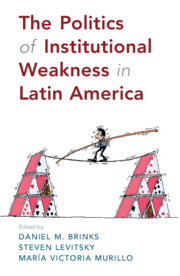Book contents
- The Politics of Institutional Weakness in Latin America
- The Politics of Institutional Weakness in Latin America
- Copyright page
- Contents
- Figures
- Maps
- Tables
- Contributors
- Acknowledgments
- 1 The Political Origins of Institutional Weakness
- 2 When (Electoral) Opportunity Knocks
- 3 The Stickiness of “Bad” Institutions
- 4 Presidential Crises in Latin America
- 5 Coercion Gaps
- 6 Aspirational Laws as Weak Institutions
- 7 The Social Determinants of Enforcement
- 8 A Multilevel Approach to Enforcement
- 9 What/Whose Property Rights?
- 10 Imported Institutions
- 11 Social Origins of Institutional Strength
- 12 Conclusion
- Bibliography
- Index
12 - Conclusion
Published online by Cambridge University Press: 06 May 2020
- The Politics of Institutional Weakness in Latin America
- The Politics of Institutional Weakness in Latin America
- Copyright page
- Contents
- Figures
- Maps
- Tables
- Contributors
- Acknowledgments
- 1 The Political Origins of Institutional Weakness
- 2 When (Electoral) Opportunity Knocks
- 3 The Stickiness of “Bad” Institutions
- 4 Presidential Crises in Latin America
- 5 Coercion Gaps
- 6 Aspirational Laws as Weak Institutions
- 7 The Social Determinants of Enforcement
- 8 A Multilevel Approach to Enforcement
- 9 What/Whose Property Rights?
- 10 Imported Institutions
- 11 Social Origins of Institutional Strength
- 12 Conclusion
- Bibliography
- Index
Summary
We began this book with the premise that what ultimately distinguishes strong institutions from weak ones is that the former matter more than the latter. The same institution, in two different contexts or at two different times, is stronger if it makes more of a behavioral difference in one instance than in the other. As the chapters in this volume make clear, however, it is difficult to evaluate exactly how much an institution “matters.” It is relatively simple to say that an institution is strong because, on paper, it possesses features that should make it matter – for example, it commands great things. But it is an altogether different – and, we believe, far more interesting – thing to say that an institution is strong because it actually produces an outcome that is substantially different from what we might have observed in its absence, and that it continues to produce that outcome even in the face of pressures to change it or avoid it altogether.
- Type
- Chapter
- Information
- The Politics of Institutional Weakness in Latin America , pp. 277 - 298Publisher: Cambridge University PressPrint publication year: 2020
- 1
- Cited by

